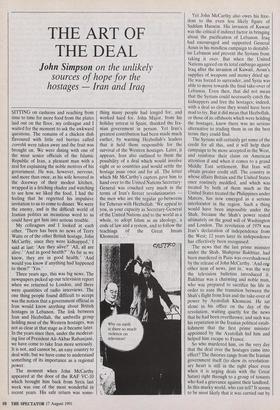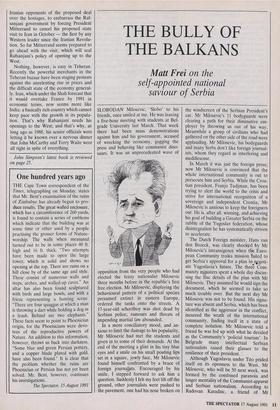THE ART OF THE DEAL
John Simpson on the unlikely
sources of hope for the hostages — Iran and Iraq
SITTING on cushions and reaching from time to time for more food from the plates laid out on the floor, my colleague and I waited for the moment to ask the awkward questions. The remains of a chicken dish flavoured with little red berries called zoreshk were taken away and the fruit was brought on. We were dining with one of the most senior officials of the Islamic Republic of Iran, a pleasant man with a zeal for explaining the noble motives of his government. He was, however, nervous; and more than once, as his wife hovered in the doorway of their modest kitchen, wrapped in a fetching chador and watching to see how we liked the food, I had the feeling that he regretted his impulsive invitation to us to come to dinner. We were the enemy, and in the difficult world of Iranian politics an incautious word to us could have got him into serious trouble.
My colleagues and I looked at each other. 'There has been no news of Terry Waite or of the other British hostage, John McCarthy, since they were kidnapped,' I said at last: 'Are they alive?"All, all are alive.' And in good health?' As far as we know, they are in good health.' And would you know if anything had happened to them?' Yes.'
Three years ago, this was big news. The newspapers picked up our television report when we returned to London, and there were quantities of radio interviews. The one thing people found difficult to accept was the notion that a government official in Iran would know anything about British hostages in Lebanon. The link between Iran and Hezbollah, the umbrella group holding most of the Western hostages, was not as clear at that stage as it became later. In the years since then, under the moderat- ing line of President Ali-Akbar Rafsanjani, we have come to take Iran more seriously. It is not, and cannot be, an easy country to deal with; but we have come to understand something of its importance as a regional power.
The moment when John McCarthy appeared at the door of the RAF VC-10 which brought him back from Syria last week was one of the most wonderful in recent years. His safe return was some- thing many people had longed for, and worked hard for. John Major, from his holiday retreat in Spain, thanked the Ira- nian government in person. Yet Iran's greatest contribution had been made much earlier, by warning Hezbollah's leaders that it held them responsible for the survival of the Western hostages. Later, it appears, Iran also outlined to them the possibility of a deal which would involve eight or so countries and would settle the hostage issue once and for all. The letter which Mr McCarthy's captors gave him to hand over to the United Nations Secretary- General was couched very much in the terms of Iran's fiercer revolutionaries — the men who are the regular go-betweens for Teheran with Hezbollah: 'We appeal to you, in your capacity as Secretary-General of the United Nations and to the world as a whole, to adopt Islam as an ideology, a code of law and a system, and to follow the teachings of the Great Imam Khomeini . . Yet John McCarthy also owes his free- dom to the even less likely figure of 'Saddam Hussein. His invasion of Kuwait was the critical if indirect factor in bringing about the pacification of Lebanon. Iraq had encouraged and supported General Aoun in his mindless campaign to destabil- ise Lebanon and prevent the Syrians from taking it over. But when the United Nations agreed on its total embargo against Iraq after the invasion of Kuwait, Aoun's supplies of weapons and money dried up. He was forced to surrender, and Syria was able to move towards the final take-over of Lebanon. Even then, that did not mean that the Syrians could necessarily catch the kidnappers and free the hostages; indeed, with a deal so close they would have been mad to try. But it did mean that Hezbollah, or those of its offshoots which were holding the hostages, knew there was no serious alternative to trading them in on the best terms they could find.
The Syrians will certainly get some of the credit for all this, and it will help their campaign to be more accepted in the West, and reinforce their claim on American attention if and when it comes to a grand Middle East settlement. But Iran will obtain greater credit still. The country in whose affairs Britain and the United States once routinely meddled, and which was treated by both of them much as the United States treated the Philippines under Marcos, has now emerged as a serious interlocutor in the region. Such a thing would have been impossible under the Shah, because the Shah's power rested ultimately on the good will of Washington and London. The revolution of 1979 was Iran's declaration of independence from the West; 12 years later its independence has effectively been recognised.
The news that the last prime minister under the Shah, Shahpour Bakhtiar, had been murdered in Paris was overshadowed by the release of John McCarthy. 'And one other item of news, just in,' was the way the television bulletins introduced it. Bakhtiar was a charming and noble man, who was prepared to sacrifice his life in order to ease the transition between the Shah's flight from Iran and the take-over of power by Ayatollah Khomeini. He sat alone in his office on the day of the revolution, waiting quietly for the news that he had been overthrown; and such was his reputation in the Iranian political estab- lishment that the first prime minister appointed by the Ayatollah hid him and helped him escape to France.
So who murdered him, on the very day that the deal over the hostages came into effect? The theories range from the Iranian government itself (to show its revolution- ary heart is still in the right place even when it is urging deals with the Great Satan) right through to a group of tenants who had a grievance against their landlord. In this murky world, who can tell? It seems to be most likely that it was carried out by Iranian opponents of the proposed deal over the hostages, to embarrass the Raf- sanjani government by forcing President Mitterrand to cancel his proposed state visit to Iran in October — the first by any Western leader since the Iranian Revolu- tion. So far Mitterrand seems prepared to go ahead with the visit, which will seal Rafsanjani's policy of opening up to the West.
Nothing, however, is easy in Teheran. Recently the powerful merchants in the Teheran bazaar have been staging protests against the unrelenting rise in prices and the difficult state of the economy general- ly. Iran, which under the Shah forecast that it would overtake France by 1991 in economic terms, now seems more like India: a basically rich country which cannot keep pace with the growth in its popula- tion. That's why Rafsanjani needs his openings to the West; and that's why, as long ago as 1988, his senior officials were letting it be known over a nervous dinner that John McCarthy and Terry Waite were all right in spite of everything.
John Simpson's latest book is reviewed on page 25.



















































 Previous page
Previous page